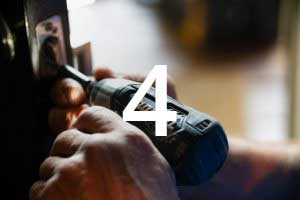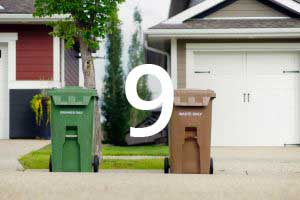September 23-29, 2019 sees Climate Week NYC take place in venues throughout New York, with non-profit The Climate Group, the City of New York, and the UN working together to coordinate hundreds of events over Climate Week and through the newly established Climate Hub. The week-long program will run in conjunction with the UN Secretary-General’s Climate Action Summit on Monday, September 23, with both aiming to set the tone for the acceleration of climate action for individuals, businesses, and governments around the world.
As the world wakes up to the impacts of climate change and the part that we play in it, events such as these are more important than ever, ensuring everyone from business owners to international leaders are engaged and empowered to make real change. With this in mind, and to celebrate the largest ever Climate Week NYC, we take a look at how a zero-waste lifestyle is within everyone’s reach.
What is the Zero Waste Life?
The Zero Waste movement is being adopted across a broad range of industries and in homes across the world. At its core, it’s simply a set of principles that focuses on waste prevention and the redesign of systems to ensure that products are reused instead of recycled or simply sent to landfills.
While zero waste is about sending nothing to landfills through reduction, reuse, and recycling, it also has a broader scope. Put simply, zero waste aims to redefine our existing systems through the use of a circular economy, replacing traditional cradle-to-grave (take-make-waste) thinking in favor of a cradle-to-cradle approach that ensures resources are kept in circulation for as long as possible.
The benefits of a zero-waste lifestyle are plentiful and reducing the amount of waste that ends up in landfills is a high priority. A truly zero-waste approach will also minimize our reliance on inefficient recycling processes while subsequently creating new jobs and encouraging more sustainable industries that no longer rely on fossil fuels.
How To Live The Zero Waste Lifestyle
Whether for businesses or individuals, living the zero-waste lifestyle follows a similar pattern. The core principles are directly related to circular economy principles, and the three Rs are an excellent guideline to get started.
- Reduction — Reducing the amount of single-use packaging we consume and discard is a priority—even recyclable packaging is a drain on existing systems. Reduction of all consumption must be the goal (electronics, clothing, food waste, construction waste, etc.)
- Reuse — When reduction is not possible, reusing products and materials is the next best option. Packaging such as jars, bottles, and plastic trays are likely the best examples. Products such as electronics, tools, and clothes can also find a new lease on life through upcycling. Waste materials such as food, fabrics, wood and even synthetic snow are other contenders. Additionally, even traditional waste materials may find new uses—such as bread to make beer!
- Recycle — If neither of the first two options are viable, recycling should be the last resort. Ensure you consult municipality guidelines on recycling or reach out for guidance on how your business can recycle effectively, as recycling rules change from city to city.
Zero Waste Lifestyle Tips
There are simple steps that can be taken today to move towards a zero-waste lifestyle, and when both work in tandem, then it’s possible to reduce significant amounts of waste in a very short span of time. Additionally, while consuming less is important, changing the way we consume and dealing with the waste we have already created are also integral parts of a movement that will ensure our living standards are not compromised while still effectively tackling climate change.
Here, we take a look at a few zero waste lifestyle tips that will help us work together to take real action.
For You
Use a reusable water bottle and refill rather than purchasing single-use bottles.
For Your Business
Offer employees and customers compostable bottles, paper cups, or better yet, reusable plastic/ceramic cups.
For You
Use your own bags for no-package-produce and avoid plastic-packaged food when grocery shopping. Reuse shopping bags.
For Your Business
Use plastic alternatives for packaging. Encourage employees and customers to bring their own bags and storage containers.
For You
Buy in bulk and store in reusable jars, bottles, or cans. Reuse any packaging as best you can.
For Your Business
Partner with vendors who minimize plastic packaging and are willing to supply in bulk.
For You
Repair products and extend their lifespan. There are often local services that municipalities offer residents to help repair a broad range of items.
For Your Business
Offer simple repairs on your products to your customers (or recommend local businesses that do). Sell spare parts and replacements.
For You
Compost all food waste. For apartment dwellers, vermicompost or bokashi bins are alternatives that will not take up too much space or smell.
For Your Business
For restaurants in particular, composting solutions are important. Buy seasonal produce from local sources and donate viable food waste.
For You
Buy local when possible. Buying local reduces waste during transit and boosts the economy.
For Your Business
Ensure products are labeled with country of origin and sustainably sourced.
For You
Buy secondhand/used. Ensure “outdated” products find a new home through donation.
For Your Business
Create products that last and encourage a healthy secondhand market.
For You
Try natural cleaning products such as vinegar, baking soda, citrus oil, and olive oil.
For Your Business
Buy natural replacements for conventional cleaning products. Avoid plastic and buy in bulk.
For You
Ensure recycling is correctly sorted. Ensure recycling and other types of waste (electronic, hazardous) are taken to the correct facility.
For Your Business
Provide clearly labeled containers for recycling and composting. Track waste to ensure recycling is going to the correct facilities and understand how much you are diverting from landfills.
For You
Join a zero-waste community group and promote zero waste wherever possible. Everyone can join!
For Your Business
Invest in education from LEED accredited TRUE Advisors to ensure employees can properly reduce, reuse, and recycle!
For businesses looking for more information on how to transition to zero waste, how to track waste streams, and how to invest in zero waste education, contact RTS today.











